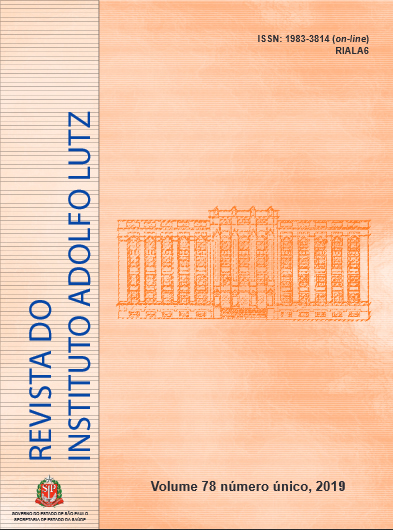Abstract
Toxoplasmosis is a parasitic zoonosis with a wide worldwide distribution caused by
Toxoplasma gondii, which is considered one of the most successful protozoa on the planet,
since it can infect a third of the world population. Among the forms of transmission,
consumption of undercooked meat has been considered as a risk factor for the acquisition of
this zoonosis. An alternative approach to toxoplasmosis control by beef ingestion could be the
serological diagnosis in cattle, since seropositives animals harbor tissue cysts. However, the
use of serum for this evaluation is not always feasible due to the difficulty of blood collection
during slaughter and its absence in commercial beef cuts. Meat exudate is an alternative for
the detection of anti-T. gondii antibodies in commercial beef cuts, which was the propose of
this study to evaluate the performance of Indirect Hemagglutination (HI) and Agglutination
Modified (MAT) tests compared to ELISA using meat exudates. This study showed that the
agglutination tests accuracy was not viable due to low sensitivity and specificity indexes when
compared to ELISA. These data demonstrate the importance of choosing accurate tests such as
ELISA for application in quality control and safety of commercial beef cuts.
References
Carloto ACM, Conchon-Costa I, Pavanelli WR
et al. “Nanomedicine advances in toxoplasmosis:
diagnostic, treatment, and vaccine applications”.
Parasitol Res. 2017;116(6):1603-1615. https://dx.doi.
org/10.1007/s00436-017-5458-2
2. Djurković-Djaković O, Dupouy-Camet J, Giessen
JV, Dubey JP. Toxoplasmosis: overview from a One
Health perspective. Food Waterborne Parasitol.
2019;15:e00054. https://dx.doi.org/10.1016/j.
fawpar.2019.e00054
3. Verma SK, Sweeny AR, Lovallo MJ, Calero-Bernal
R, Kwok OC, Jiang T et al. Seroprevalence, isolation
and co-infection of multiple Toxoplasma gondii
strains in individual bobcats (Lynx rufus) from
Mississippi, USA. Int J Parasitol. 2017;47(5):297-
303. https://dx.doi.org/ 10.1016/j.ijpara.2016.12.007
4. Hill DE, Dubey JP. Toxoplasma gondii: transmission,
diagnosis and prevention. Clin Microbiol Infect.
2002;8(10):634–40. https://dx.doi.org/10.1046/
j.1469-0691.2002.00485.x
5. Kijlstra A, Jongert E. Control of the risk of human
toxoplasmosis transmitted by meat. Int J Parasitol.
2008;38(12):1359-70.https://dx.doi.org/10.1016/j.
ijpara.2008.06.002
6. Tenter AM, Heckeroth AR, Weiss LM. Toxoplasma
gondii: from animals to humans. Int J Parasitol.
2000;30(12-13):1217-58. https://dx.doi.org/10.1016/
s0020-7519(00)00124-7
7. McAllister MM. A decade of discoveries in veterinary
protozoology changes our concept of “subclinical”
toxoplasmosis. Vet Parasitol. 2005;132:241-7.
https://dx.doi.org/10.1016/j.vetpar.2005.07.003
8. Tenter AM. Toxoplasma gondii in animals used for
human consumption. Mem Inst Oswaldo Cruz.
2009;104(2):364-9. https://dx.doi.org/ 10.1590/
s0074-02762009000200033
9. Dubey JP, Lindsay DS, Speer CA. Structures of
Toxoplasma gondii tachyzoites, bradyzoites, and
sporozoites and biology and development of tissue
cysts. Clin Microbiol Rev.1998;11(2):267–99.
10. Dubey JP, Thulliez P. Persistence of tissue cysts
in edible tissues of cattle fed Toxoplasma gondii
oocysts. Am J Vet Res. 1993;54(2):270-3.
11. Schlüter D, Däubener W, Schares G, Groß U, Pleyer
U, Lüder C. Animals are key to human toxoplasmosis.
Int J Med Microbiol. 2014;304(7):917-29. https://
dx.doi.org/10.1016/j.ijmm.2014.09.002
12. Marciano MAM. Pesquisa de IgG anti-Toxoplasma
gondii em exsudato cárneo para monitoramento da
qualidade da carne bovina. [dissertação de mestrado].
São Paulo (SP): Universidade de São Paulo; 2013.
[resumo]. Disponível em: http://www.imt.usp.br/wpcontent/uploads/bib/Catalogo_Dis_Tes_IMTSP_v1.pdf
13. Mecca JN, Meireles LR, de Andrade Jr HF. Quality
control of Toxoplama gondii in meat packages:
standardization of an ELISA test and its use for
detection in rabbit meat cuts. Meat Sci. 2011;88(3):584–
9. https://dx.doi.org/10.1016/j.meatsci.2011.01.016
14. Desmonts G, Remington JS. Direct agglutination
test for diagnosis of Toxoplasma infection:
method for increasing sensitivity and specificity.
J Clin Microbiol. 1980;11(6):562–8. https://dx.doi.
org/ 10.1128/JCM.11.6.562-568.1980
15. Stelzer S, Basso W, Benavides J, Ortega-Mora LM,
Maksimov P, Gethmann J et al. Toxoplasma gondii
infection and toxoplasmosis in farm animals:
risk factors and economic impact. Food
Waterborne Parasitol. 2019;15:e00037. https://
doi.org/10.1016/j.fawpar.2019.e00037
16. Dubey JP. Isolation of Toxoplasma gondii
from a naturally infected beef cow. J Parasitol.
1992;78(1):151-3.

This work is licensed under a Creative Commons Attribution 4.0 International License.
Copyright (c) 2019 Instituto Adolfo Lutz Journal
